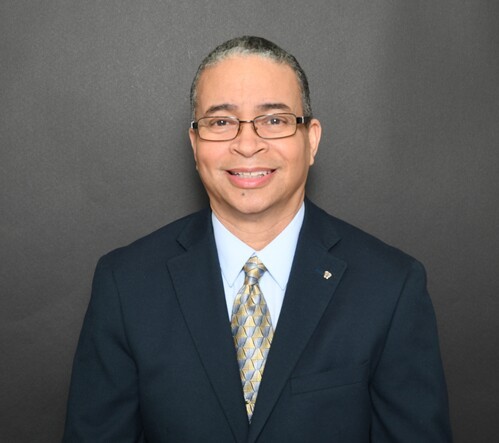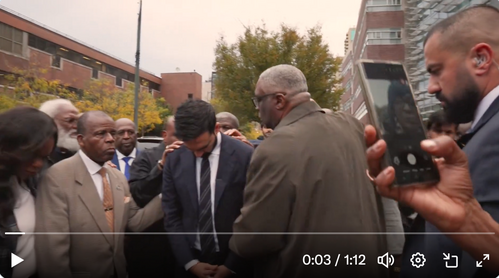When Ministers Pray Over Mamdani: A Misplaced Gesture or Apostasy?
By Dr. Eric M. Wallace
In a recent social media post, I observed with dismay: ministers publicly prayed over Zohran Mamdani as though he were already New York’s mayor. To my mind, this was a dangerous sign of spiritual presumption — especially when Mamdani, a Muslim socialist, holds beliefs that are profoundly at odds with the gospel. I believe the proper posture would have been a private prayer for his salvation, asking God to grant him an honest and good heart, according to Luke 8:15. If Christians must pray for good governance, that prayer should come after the election—not before it. Until then, we should be praying for the right person to win, someone whose convictions most closely align with biblical principles. If this public praying over a candidate doesn’t reveal a heart of apostasy, I don’t know what does.
A Theology of Timing: Prayers Before vs. After Election
Public intercession for leaders is, in itself, not inherently wrong. But there is a spiritual logic to order. The first and greatest mission of the church is the gospel: the conversion, sanctification, and alignment of all hearts to Christ. Thus, prayers for salvation must precede prayers for governance.
When ministers invoke divine blessing over a candidate before election, they risk elevating that person—implicitly treating them as though they already hold authority. That gesture conveys more than a prayer: it signals confidence and support. If the candidate’s beliefs deeply conflict with Christianity, that act strains credulity.
Moreover, public prayers cast in such a context may become de facto endorsements, making it harder to criticize policies or actions later. Ministers may inadvertently tie their spiritual legitimacy to the candidate’s success or failure.
The Gospel and Mamdani’s Worldview
Zohran Mamdani’s faith and ideology are antithetical to the gospel as Christians understand it. His identification as a Muslim means he rejects core claims of Christ’s lordship. His embrace of democratic socialism tends to promote collectivist and state-centered solutions rather than Christian notions of individual responsibility, stewardship, and the primacy of spiritual transformation.
Given that fundamental divergence, praying publicly over him before an election suggests tacit alignment—or at least a blurring of the boundary between Christian allegiance and secular politics. That is not just poor strategy: it undermines the church’s prophetic witness.
What Ministers Should Have Done Instead
If the goal is to keep church and mission pure, here is how faithful engagement should look:
Apostasy or Presumption?
To call what happened “apostasy” is strong. But the heart behind it matters. If ministers treat temporal political figures with the same devotion reserved for Christ, that is a grave spiritual misalignment. If they conflate election results with God’s favor, or blur gospel and party, then we tread perilously close to idolatry.
An apostate church does not simply drift silently; it substitutes another sovereignty in place of the Lord. Praying publicly over a candidate who rejects Christ’s lordship—and doing so before any electoral mandate—is a symbolic usurpation. It sends the message that political victory is the real objective—not the advance of Christ’s kingdom.
Conclusion: Reaffirming the Church’s Priority
The church’s identity is not won through politics; its power is in the cross, the Word, and sanctified witness. Ministers must resist pressure to join every political procession prematurely. Our posture should be first to call sinners to Christ, then to pray for rulers, then to prophetically speak into power—not the other way around.
When ministers publicly pray over candidates like Mamdani before election, they risk confusing the people of God. Let us instead keep the gospel central, reserve public intercession for the proper time, and pray first for the salvation of all—regardless of who wins.
In a recent social media post, I observed with dismay: ministers publicly prayed over Zohran Mamdani as though he were already New York’s mayor. To my mind, this was a dangerous sign of spiritual presumption — especially when Mamdani, a Muslim socialist, holds beliefs that are profoundly at odds with the gospel. I believe the proper posture would have been a private prayer for his salvation, asking God to grant him an honest and good heart, according to Luke 8:15. If Christians must pray for good governance, that prayer should come after the election—not before it. Until then, we should be praying for the right person to win, someone whose convictions most closely align with biblical principles. If this public praying over a candidate doesn’t reveal a heart of apostasy, I don’t know what does.
A Theology of Timing: Prayers Before vs. After Election
Public intercession for leaders is, in itself, not inherently wrong. But there is a spiritual logic to order. The first and greatest mission of the church is the gospel: the conversion, sanctification, and alignment of all hearts to Christ. Thus, prayers for salvation must precede prayers for governance.
When ministers invoke divine blessing over a candidate before election, they risk elevating that person—implicitly treating them as though they already hold authority. That gesture conveys more than a prayer: it signals confidence and support. If the candidate’s beliefs deeply conflict with Christianity, that act strains credulity.
Moreover, public prayers cast in such a context may become de facto endorsements, making it harder to criticize policies or actions later. Ministers may inadvertently tie their spiritual legitimacy to the candidate’s success or failure.
The Gospel and Mamdani’s Worldview
Zohran Mamdani’s faith and ideology are antithetical to the gospel as Christians understand it. His identification as a Muslim means he rejects core claims of Christ’s lordship. His embrace of democratic socialism tends to promote collectivist and state-centered solutions rather than Christian notions of individual responsibility, stewardship, and the primacy of spiritual transformation.
Given that fundamental divergence, praying publicly over him before an election suggests tacit alignment—or at least a blurring of the boundary between Christian allegiance and secular politics. That is not just poor strategy: it undermines the church’s prophetic witness.
What Ministers Should Have Done Instead
If the goal is to keep church and mission pure, here is how faithful engagement should look:
- Pray privately first: Ask God to soften his heart, bring him to repentance, open his eyes to truth, and grant him integrity and humility—whether or not he ever holds office.
- Pray publicly only after discernment: If, after the election, he becomes mayor (or holds a public office), then churches can pray over that office—asking God to guide, restrain, and redeem.
- Pray for the right person: Before the polls, intercede for the candidate who most nearly reflects biblical convictions—even if imperfect.
- Keep the content of the prayer faithful: Public prayers should affirm justice, humility, truth, accountability—not vague platitudes. If you pray for a leader, you must also pray against corruption, deception, tyranny.
- Maintain prophetic distance: Ministers must remain willing to critique, correct, and confront—not be bound by their own public blessing.
Apostasy or Presumption?
To call what happened “apostasy” is strong. But the heart behind it matters. If ministers treat temporal political figures with the same devotion reserved for Christ, that is a grave spiritual misalignment. If they conflate election results with God’s favor, or blur gospel and party, then we tread perilously close to idolatry.
An apostate church does not simply drift silently; it substitutes another sovereignty in place of the Lord. Praying publicly over a candidate who rejects Christ’s lordship—and doing so before any electoral mandate—is a symbolic usurpation. It sends the message that political victory is the real objective—not the advance of Christ’s kingdom.
Conclusion: Reaffirming the Church’s Priority
The church’s identity is not won through politics; its power is in the cross, the Word, and sanctified witness. Ministers must resist pressure to join every political procession prematurely. Our posture should be first to call sinners to Christ, then to pray for rulers, then to prophetically speak into power—not the other way around.
When ministers publicly pray over candidates like Mamdani before election, they risk confusing the people of God. Let us instead keep the gospel central, reserve public intercession for the proper time, and pray first for the salvation of all—regardless of who wins.

Dr. Eric M. Wallace, author of the new book, The Heart of Apostasy: How The Black Church Abandoned Biblical Authority for Political Ideology--And How to Reclaim It, is a trailblazing scholar, dynamic speaker, and passionate advocate for faith-based conservatism. With a distinguished academic background and an unwavering commitment to biblical truth, Wallace has become a leading voice challenging cultural and political narratives that conflict with a biblical worldview.
Wallace holds postgraduate degrees in biblical studies (M.A., ThM, Ph.D.), Wallace is the first African American to earn a Ph.D. in biblical studies from Union-PSCE (now Union Presbyterian Seminary). His scholarship and ministry experience equip him to address today’s most pressing sociopolitical issues through the lens of faith, reason, and historical accuracy.
Wallace holds postgraduate degrees in biblical studies (M.A., ThM, Ph.D.), Wallace is the first African American to earn a Ph.D. in biblical studies from Union-PSCE (now Union Presbyterian Seminary). His scholarship and ministry experience equip him to address today’s most pressing sociopolitical issues through the lens of faith, reason, and historical accuracy.
Posted in #Mamdani, Muslim, socialist, Gospel, Pastors, Prayer, New York City, #election, #heartofapostasy, Christianity, political left
Recent
The Heart of the Matter Is the Matter of the Heart
February 14th, 2026
People of Color can also steal…Duh?
February 14th, 2026
The Monroe Doctrine Isn’t Outdated — It’s Vital for American Security
January 5th, 2026
Defining Racism “UP”
January 4th, 2026
The Voting Rights Act Should Protect Voting—Not Perpetuate Fear
January 4th, 2026
Archive
2026
2025
February
March
July
September
October
November
2024
January
Cartoon 01/01/24Cartoon 01/02/24Claudine Gay Betrayed the American Values of My Black Elders to Exploit White GuiltCartoon 01/03/24Cartoon 01/05/24Cartoon 01/06/24Cartoon 01/07/24Cartoon 01/08/24We need a David, not a SaulCartoon 01/13/24Cartoon 01/09/24Cartoon 01/10/24Cartoon 01/11/24Cartoon 01/14/24Cartoon 01/12/24What Happens to a King Deferred? A ReduxCartoon 01/15/24Cartoon 01/16/24The Good Guys with Guns Part 1Cartoon 01/17/24America Works. DEI Doesn’t.Cartoon 01/18/24Cartoon 01/23/24Good Guys with Guns Part 2Cartoon 01/19/24Cartoon 01/21/24Cartoon 01/22/24Cartoon 01/24/24Cartoon 01/26/24Cartoon 01/25/24Cartoon 01/27/24
February
Cartoon 02/04/24Cartoon 02/03/24Cartoon 02/02/24Cartoon 02/01/24Cartoon 01/31/24Cartoon 01/28/24Cartoon 01/29/24We’ve Been Gay(ed) Part 1Cartoon 02/05/24Cartoon 02/06/24Cartoon 02/07/24Cartoon 02/08/24Cartoon 02/13/24Cartoon 02/12/24Cartoon 02/09/24Cartoon 02/11/24Cartoon 02/10/24Cartoon 02/19/24'Black America at Crossroads’ of Culture Wars as Presidential Election LoomsWe’ve Been Gay(ed) Part 2Cartoon 02/18/24Cartoon 02/17/24Cartoon 02/16/24Cartoon 02/15/24Cartoon 02/14/24Cartoon 02/22/24Cartoon 02/21/24Cartoon 02/20/24America Needs a “Black Wives Matter” Movement To Rebuild the Black FamilyCartoon 02/23/24Cartoon 02/24/24Cartoon 02/25/24Cartoon 02/26/24Cartoon 02/27/24


2 Comments
I agree 100% with Dr Wallace’s astute commentary. A relatively recent photo of several clergy praying for President Trump was correctly done after his inauguration. The Bible encourages Christians to pray for our leaders, not political candidates.
You’re absolutely correct Dr.Wallace and they need to search the scriptures of the Holy bible and read what it says.